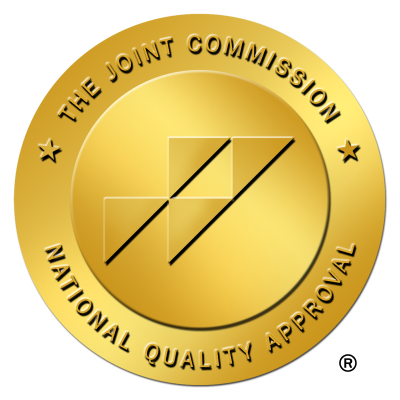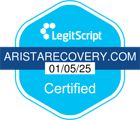How to Set Achievable Goals for Long-Term Sobriety

The Power of Goal-Setting in Addiction Recovery
Achieving sobriety demands more than just sheer willpower; it calls for a strategic and structured approach to breaking free from addiction. One of the most effective strategies in this journey is setting achievable goals. By providing a clear path, motivation, and the means to measure progress, goal-setting enhances the recovery process, making it a vital tool for those seeking long-term sobriety. This article explores the methodology of setting goals, offers practical examples, and delves into the transformative impact such strategies have on recovery.
Understanding the Role of Goal-Setting in Recovery

How can goal-setting aid in addiction recovery?
Goal-setting is a vital component of addiction recovery as it provides structure, motivation, and a clear framework for tracking progress. It helps individuals establish meaningful objectives, which enhances their engagement in recovery programs and promotes continued participation in treatment.
Setting realistic and attainable goals with therapists fosters a sense of accountability and direction, ultimately improving recovery outcomes and patient satisfaction. Collaboratively working on these goals allows individuals to identify personal strengths and weaknesses, which is crucial as they navigate their recovery journey.
Furthermore, the act of achieving these goals boosts self-esteem and reinforces commitment to sobriety. By focusing on small, tangible steps rather than overwhelming long-term changes, individuals can build confidence as they progress through their recovery.
Enhancing commitment and motivation
The SMART criteria—Specific, Measurable, Achievable, Relevant, and Time-bound—plays an essential role in this process. Goals shaped by this framework are clearer and more attainable, leading to a greater likelihood of success. For instance, setting a goal like attending a support group weekly offers structure and instant focus on recovery tasks.
Taking time to celebrate even small victories along the way helps maintain motivation. Each achieved goal breeds positivity and encourages individuals to keep pursuing their sobriety objectives, which is essential in overcoming the challenges of recovery.
Accountability and progress tracking
Accountability in the recovery process is significantly enhanced through goal-setting. By sharing goals with trusted friends, family, or support groups, individuals are more likely to stay committed to their plans. This ongoing support can act as a safety net, providing encouragement and helping to identify potential triggers or setbacks.
Furthermore, tracking progress—whether through journaling, therapy sessions, or recovery apps—helps reinforce commitment to sobriety. This not only allows individuals to visualize their journey but also emphasizes the importance of adaptability in goal-setting, recognizing that adjustments may be necessary as one navigates their personal recovery path.
The SMART Framework: A Guideline for Effective Goals
How do you set realistic and effective goals for long-term sobriety?
To set realistic and effective goals for long-term sobriety, utilize the SMART criteria: Specific, Measurable, Achievable, Relevant, and Time-bound. This framework aids individuals in establishing clear objectives crucial for successful recovery.
Defining SMART goals:
- Specific: Goals should be clear. Instead of saying "I want to drink less," specify by stating, "I will attend two support meetings each week."
- Measurable: Include aspects that can be quantified. For instance, aim for drinking eight glasses of water daily. This allows tracking progress effectively.
- Achievable: Ensure that goals resonate with personal capabilities. Goals should inspire motivation without feeling overwhelmingly difficult.
- Relevant: Select goals that align with personal recovery values, such as focusing on sobriety before tackling other life challenges.
- Time-bound: Attach deadlines to goals to instill motivation. A goal like "I want to maintain sobriety for 30 days" sets a clear timeframe for commitment.
Applying SMART to personal recovery: Each individual's journey is unique. For example, early sobriety should prioritize recovery. Small, achievable goals like journaling daily can foster confidence and build momentum in the recovery process.
Examples of SMART goals in sobriety:
- Attend therapy sessions every Thursday.
- Practice mindfulness for 10 minutes each day.
- Reach out to a supportive friend or family member at least three times a week.
- Celebrate small milestones, like today’s commitment to sobriety, to build self-esteem.
Utilizing the SMART framework provides a structured approach to goal-setting that fosters accountability and enhances motivation throughout the recovery journey.
Examples of Meaningful Long-Term Sobriety Goals
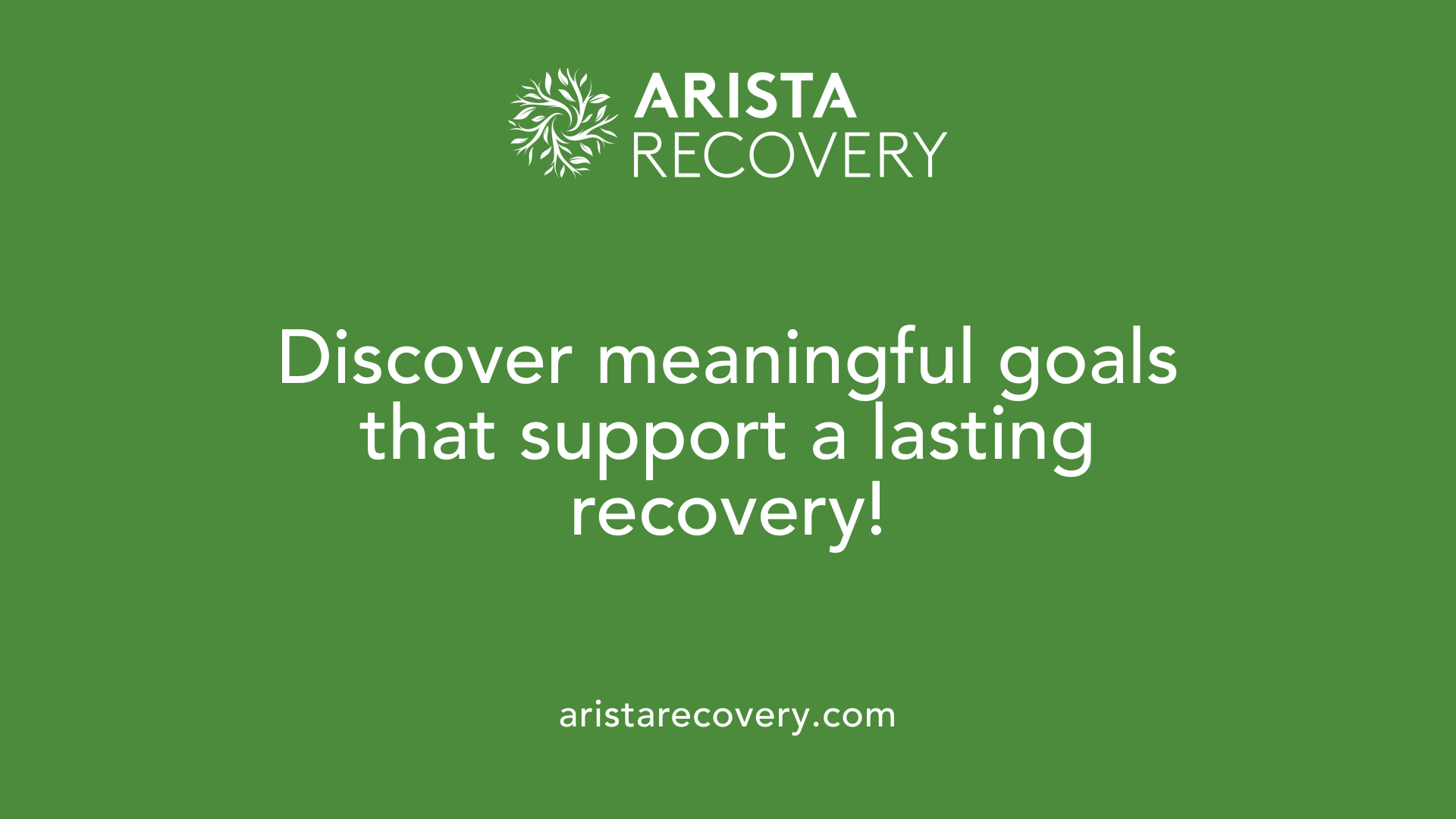
What are some examples of long-term sobriety goals?
Some examples of long-term sobriety goals include:
- Managing Triggers: Developing coping mechanisms, such as journaling and meditation, helps individuals handle cravings and avoid relapse.
- Securing Stable Housing: Having a safe and stable living environment is crucial for recovery. This can involve budgeting and applying for jobs to attain financial stability.
- Building Supportive Relationships: Maintaining connections with family and friends acts as a strong motivational factor and provides accountability throughout the recovery journey.
- Engaging in Regular Physical Activity: Incorporating physical exercise into daily routines improves overall health and emotional well-being, both of which are vital for sustaining sobriety.
- Creating a Personalized Recovery Plan: Establishing a recovery plan that includes SMART goals—Specific, Measurable, Achievable, Relevant, and Time-bound—provides clear and attainable direction toward long-term sobriety goals.
By focusing on these areas, individuals can lay a strong foundation that supports their journey to lasting sobriety.
Strategies for Sustaining Sobriety Over the Long Term
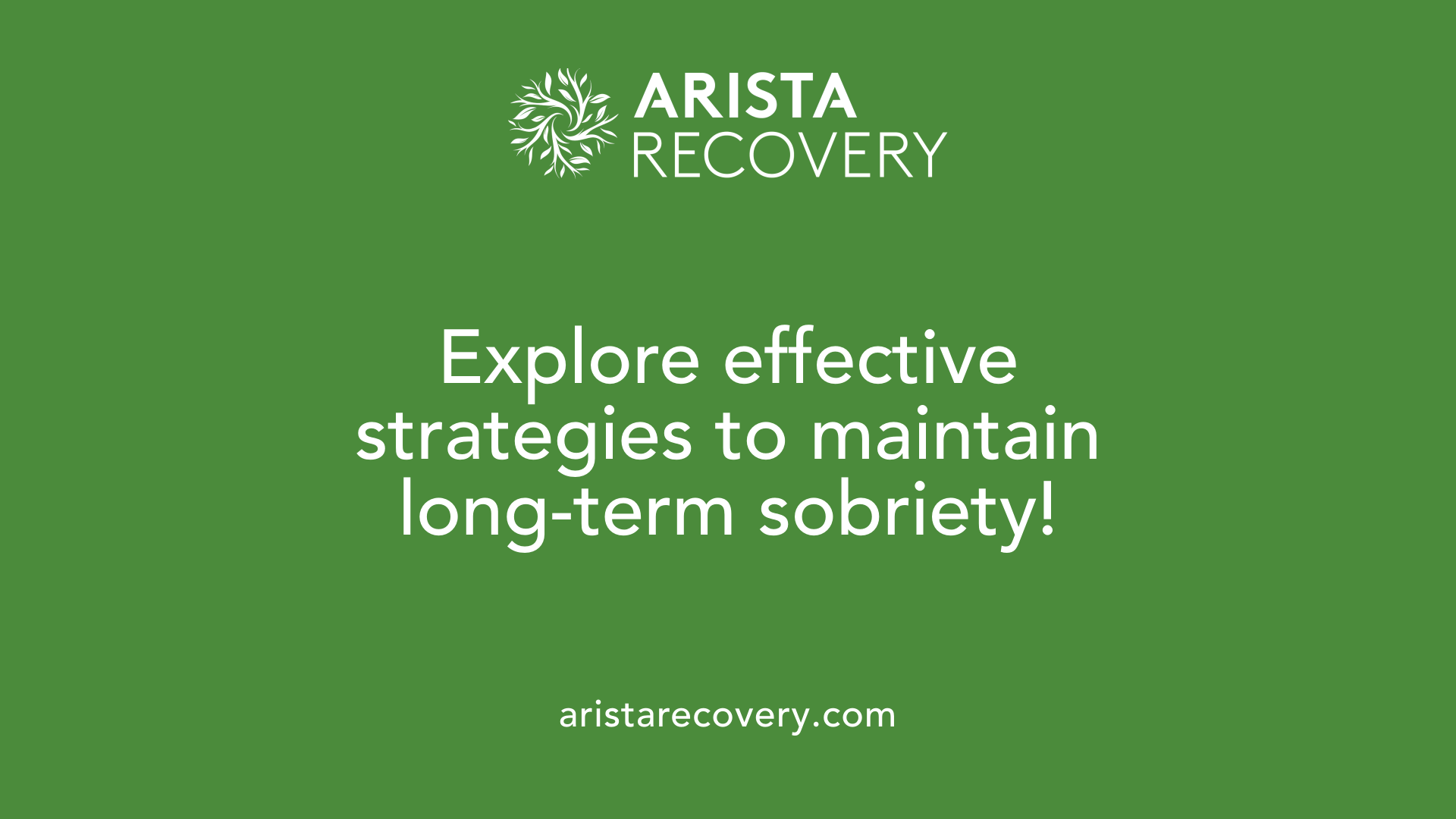
What are effective strategies for maintaining long-term sobriety?
Effectively maintaining long-term sobriety requires a comprehensive approach that includes several critical strategies.
Identify Personal Triggers
Recognizing your personal triggers is essential. Common triggers may include stress, emotional distress, or social situations. By understanding these factors, you can develop proactive strategies to manage them.Avoid High-Risk Environments
Steer clear of places or relationships that encourage substance use. Surrounding yourself with positive influences can help create a supportive environment conducive to recovery. Building healthy relationships fosters encouragement and accountability.Practice Healthy Living
Embracing a healthy lifestyle boosts overall well-being. Regular physical activity, maintaining a balanced diet, and ensuring adequate sleep help strengthen your resilience against relapse. Incorporating mindfulness practices, like meditation or yoga, can further enhance emotional regulation and stress management.Establish a Structured Daily Schedule
A well-structured day reduces idle time and helps maintain focus on recovery goals. Set specific daily routines, including time for self-care and support group meetings.Stay Connected to Support Systems
Maintaining strong connections with support systems, such as family, friends, or therapists, reinforces your commitment to sobriety. Engaging in support groups offers a sense of community and shared understanding.
For additional resources, individuals in need of assistance can contact SAMHSA’s National Helpline at 1-800-662-HELP (4357). This service offers 24/7 confidential support for anyone struggling with substance use or seeking treatment options.
The Significance of Long-Term Sobriety
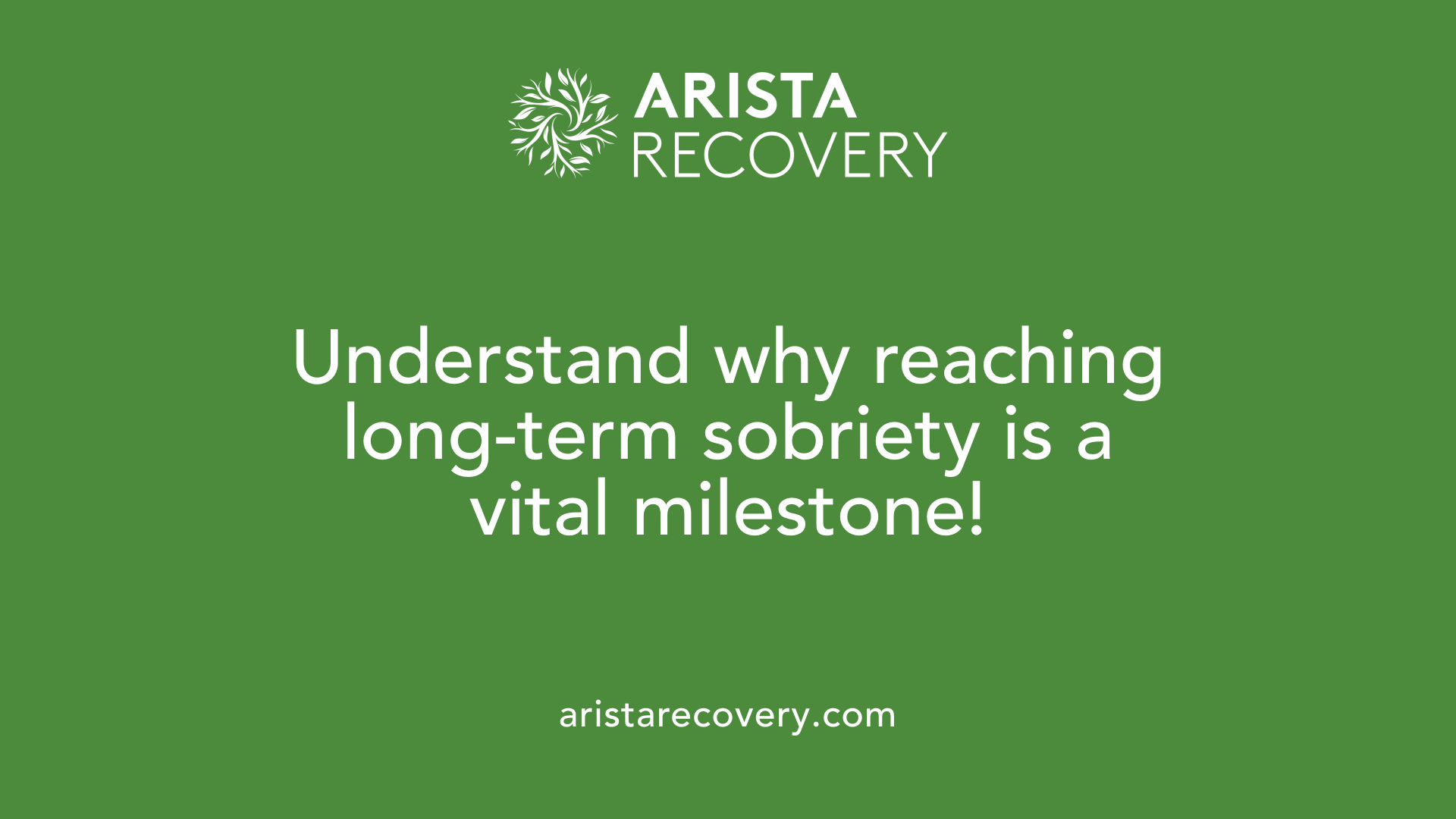
What is considered long-term sobriety and why is it significant?
Long-term sobriety is defined as sustained abstinence from alcohol or drug use for one year or more. This benchmark signifies not just a physical absence of substances but also reflects an individual's ability to adapt to and thrive in a substance-free life.
Achieving this state is crucial due to the high relapse rates associated with addiction, which can range from 40% to 60%. These statistics underscore how challenging the recovery journey can be, as individuals face both external triggers and internal conflicts. The path to long-term sobriety is facilitated by a solid support network, encompassing family, friends, and community resources, which provide the necessary encouragement and accountability.
Challenges encountered during sobriety
The journey isn't without its hurdles. Individuals often encounter stressors such as social pressures, triggers from environments where substance use occurred, and personal mental health struggles. Without effective coping strategies and professional support, these challenges can lead to setbacks.
- Triggers: Recognizing and managing triggers is vital for maintaining sobriety.
- Social Isolation: Many individuals may feel isolated, making community support essential.
The role of community support
Community plays a pivotal role in sustaining long-term sobriety. Engaging with support groups, therapy sessions, and recovery networks fosters connections that combat isolation. Help is readily available, such as resources from the National Helpline, which provides access to local treatment facilities and ongoing support. This comprehensive approach not only addresses immediate recovery needs but also promotes personal growth and resilience in the long haul.
The Importance of Gradual and Flexible Recovery Goals
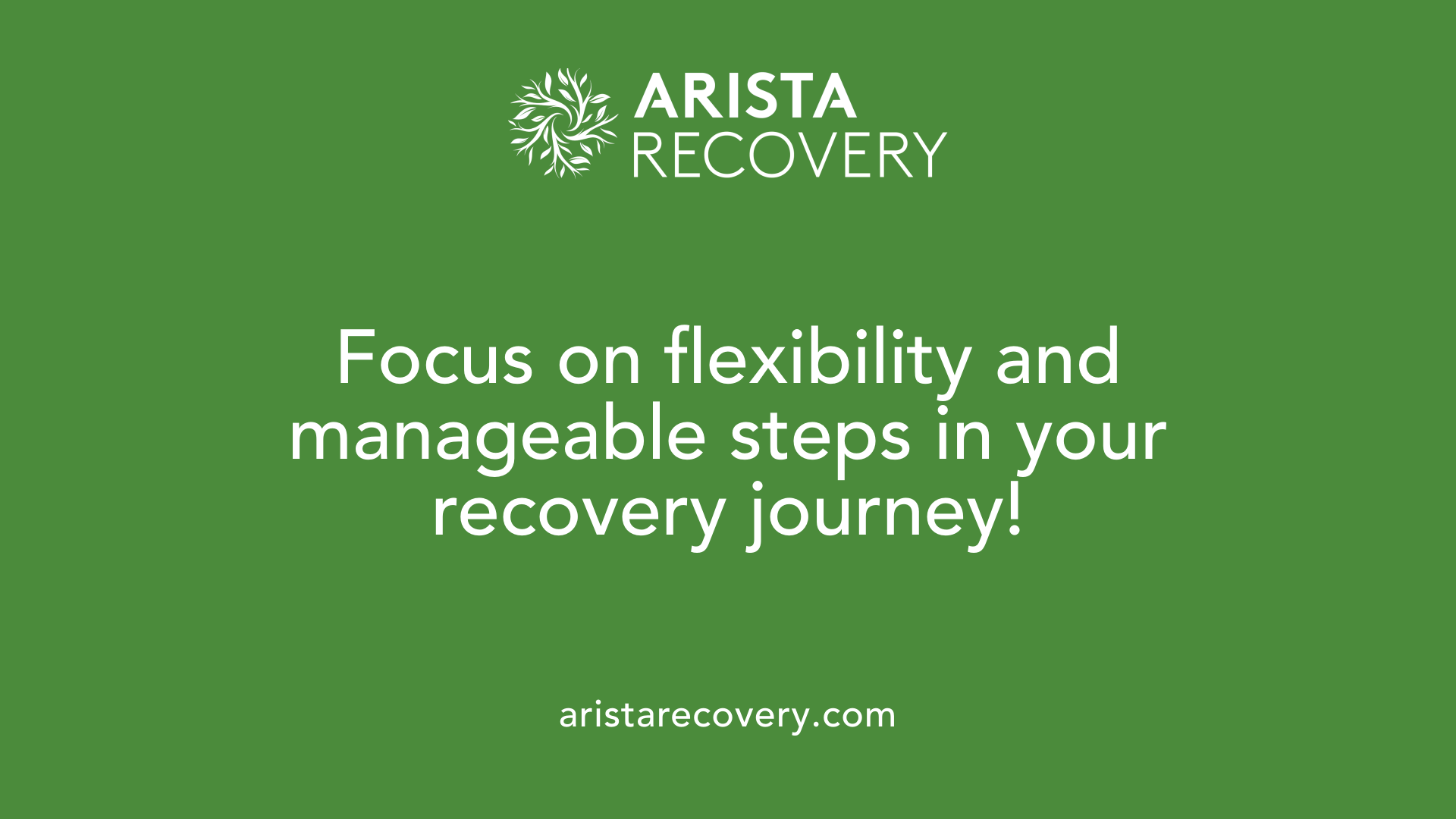
Breaking Down Goals into Manageable Steps
Setting recovery goals is essential, especially when these goals are broken down into smaller, manageable steps. This approach helps prevent feelings of overwhelm, allowing individuals to focus on their immediate recovery instead of the grand scope of sobriety. For instance, someone might set a long-term objective of abstaining from substance use but can break it down into short-term goals, such as attending weekly recovery meetings or journaling trigger moments daily.
Emphasizing Flexibility in Goal Pursuit
Flexibility is a critical component in the pursuit of recovery goals. Life is unpredictable, and circumstances can shift rapidly, making it vital to adjust goals as needed. This adaptability allows individuals to stay on track without feeling demotivated if they encounter challenges. Rather than giving up when faced with obstacles, they can reassess and alter their goals to ensure they remain relevant and achievable.
Celebrating Small Victories
Every small success during the recovery journey deserves recognition. Celebrating these victories boosts motivation and strengthens the resolve to continue making progress. Whether it’s a day of sobriety, attending a therapy session, or even sharing goals with a support group, each milestone reinforces the belief that recovery is attainable. Regularly acknowledging these achievements fosters a positive mindset, essential for sustaining long-term sobriety.
Conclusion: The Journey Toward Sustainable Sobriety
Setting achievable goals is a cornerstone of effective addiction recovery, acting as a guiding light for individuals striving toward a sober lifestyle. Through strategic planning, adaptability, and the support of a robust network, achieving and maintaining sobriety becomes a realistic and attainable objective. By embracing a goal-oriented approach, individuals not only overcome their addiction but also rebuild their lives on a foundation of positivity and resilience.
References
- National Helpline for Mental Health, Drug, Alcohol Issues - SAMHSA
- 10 Realistic Goals in Early Recovery - Tranquility Woods
- 5 Goals to Set in Addiction Recovery and How to Stick to Them
- How to Set Realistic Addiction Recovery Goals for the New Year
- How to Set Realistic and Achievable Goals for Addiction Recovery
- Setting Goals for Recovery | Mental Health America
- Can Goal-Setting Aid In Maintaining Long-Term Sobriety?
- Treatment Goals For Substance Use Disorders | J.Flowers Health
- 5 Steps to Set Goals for Long-Term Recovery

